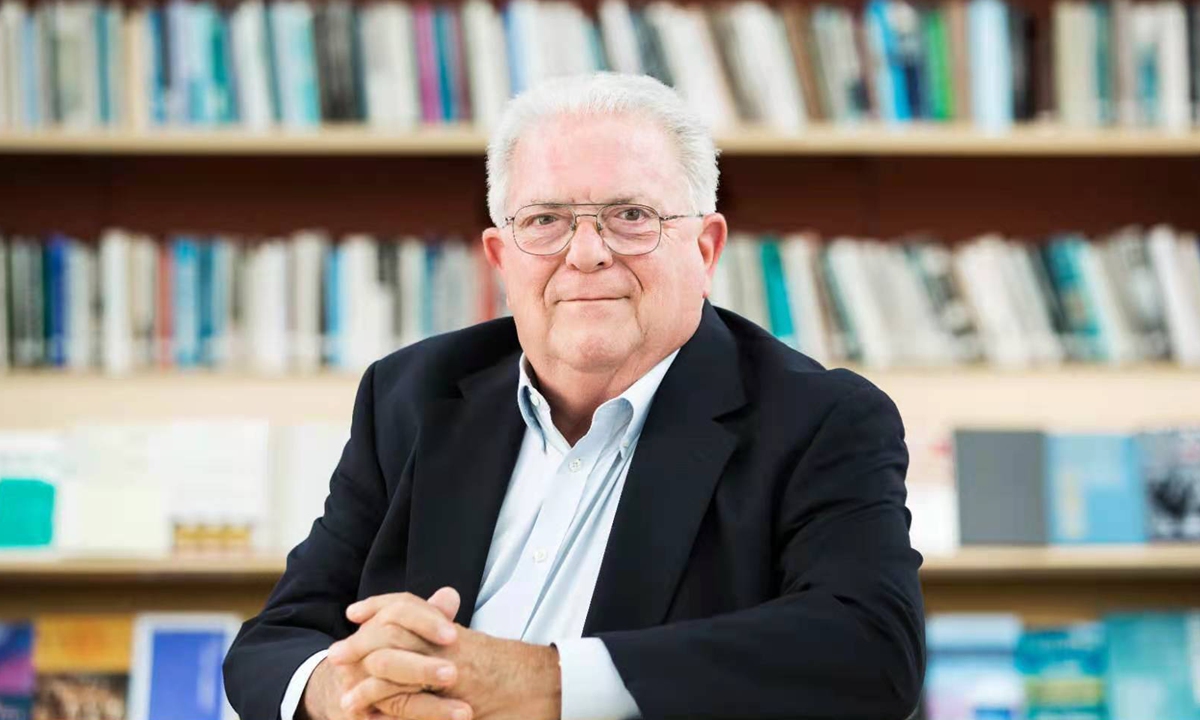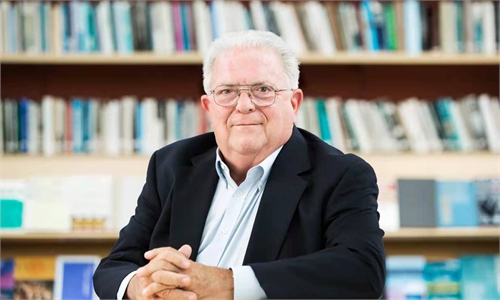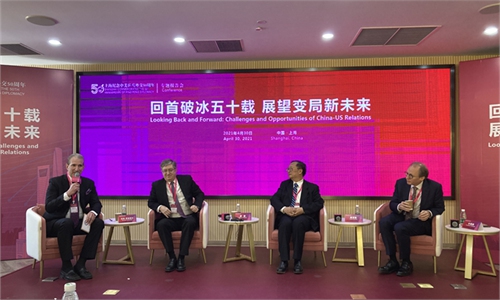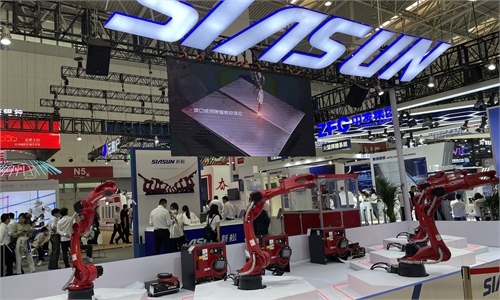
Charles W. Freeman Jr. Photo: Courtesy of Charles W. Freeman Jr.
Editor's Note:America's latest policies toward China will prove self-defeating, said Charles W. Freeman Jr. (Freeman), a former senior US diplomat who has witnessed the establishment and development of China-US diplomatic relations. Freeman, who served as the principal American interpreter during US president Richard Nixon's 1972 visit to China, believed that there is no one in sight in American politics who seems likely to match Nixon in his knowledge of foreign affairs or awareness of the requirements of statesmanship and can break the ice and improve relations with China at present. In an exclusive interview with the Global Times (GT), Freeman shared his views on various topics from China-US relations, China's development and changes to the difference between old and new "China hands."
GT: Although US President Joe Biden's personal style is different from Donald Trump, Washington's China policy under the current administration seems to be a continuation of the previous one. How do you view such a continuation? What should China expect from Biden's China policy?
Freeman: President Biden is locked into the Trump policies by his very shaky majority in Congress and by a staff who do not seem yet to have adjusted to the new realities of global politics. I do not expect change unless and until either the domestic balance of political power evolves or foreign policy failures make it unmistakably obvious that new approaches are necessary.
GT: The East Asia Forum recently published a digest of a presentation delivered by you in February at the Washington Institute of Foreign Affairs. You said in your speech, "Washington is playing a losing game with China," and "America's latest policies toward China will prove self-defeating." Why did you issue such a warning? How have US policymakers reacted to it?
Freeman: If the US is going to compete with China, it must adopt policies designed to do so, not policies aimed at hamstringing Chinese progress. Protectionism is a recognition of an inability to compete. It reduces rather than enhances economic efficiency. Imagining that past monopolies on technology and knowhow can be preserved by cutting off scientific and trade exchanges is delusional. Attempting to counter China's economic rise by military means is an exercise in irrelevance. Failing to recognize that China's increased pressure on Taiwan is a response to misguided changes in American policy is an example of what political scientists call a "security dilemma" that adversely affects efforts to manage the Taiwan question so as to avoid war.
I consider it my duty as a knowledgeable citizen to speak out when my country is making mistakes. The right to do so has long been one of the great strengths of American democracy. At present, however, "political correctness" means that views at odds with the popular narrative are routinely ignored.
GT: Responding to your views, Chinese Foreign Ministry spokesperson Hua Chunying emphasized China is not a threat to the US. Instead, the threat is within the US itself. She said China will not shy away from competition. However, the competition should be fair and just instead of depriving other countries of their normal and legitimate right to development by backstabbing or force. How do you respond to her remarks?
Freeman: I do not consider China a threat to the US per se although it is certainly an inherent threat to American primacy in East Asia and globally. In my view, this should encourage Americans to deepen our understanding of China so as to better compete with it, not to adopt politically convenient but inaccurate conceptions of what China has been, is, and is becoming.
GT: Your views have garnered much attention in China, but in the US, it seems incumbent officials have to be tough on Beijing in order to get votes. This has caused a chilly atmosphere in the US against China. Can China-US cooperation in certain areas such as climate change alleviate such a deadlock?
Freeman: Sadly, I do not believe that cooperation on climate change will be enough to restore rationality to Sino-American relations. Such cooperation will be conducted mainly in a multilateral rather than bilateral context. The recent controversy over conditions in Xinjiang and the demand by some in the US and Europe for a boycott of Chinese solar panels illustrate the difficulties this approach to restored cooperation faces.
GT: This year marks the 50th anniversary of Kissinger's visit to China, while you were the US' translator of Nixon's visit one year later. The ice-breaking trip ended the isolation between China and the US. Looking back at history, what does that period of history mean to today's China-US relations? What should we learn the most from that historical experience? In today's US, will there be another Kissinger helping break the ice with China?
Freeman: The opening of Sino-American relations as the 1970s began illustrated the benefits of defining relationships by what they can accomplish to the advantage of both sides rather than defining them by reference to irreconcilable differences. The latter approach is a path to either impasse or mutually destructive conflict.
I think the question really should be whether there will be another American leader with the strategic vision and courage of Richard Nixon. There is no one in sight in American politics now who seems likely to match Nixon in his knowledge of foreign affairs or awareness of the requirements of statesmanship. I would very much like to be proven wrong about that.
GT: A prominent Chinese scholar Zheng Yongnian argued that a "post-Kissinger mind-set" has started to take root in Washington which aims at turning the China-US-Russia triangle into a new China-US-India triangle - further roping New Delhi in to contain Beijing. How do you see this view? How might this newly coined term "post-Kissinger mind-set" influence China-US relations?
Freeman: As Marx said, history repeats itself, the first time as tragedy, the second time as farce. The would-be Kissingers of our age lack his appreciation of the subtleties of balances of power and the relationship to geopolitics of the national interests of those caught up in it.
GT: You and your family have contributed to the development of China-US relations. Why have you chosen to promote China-US relations?
Freeman: I cannot speak for my children; only for myself. I have sought to promote better Sino-American relations for the simple reason that I believe this has been and continues to be to the advantage of my country.
GT: Some of your grandchildren are also proficient in Chinese and have become the third generations of "China hands." Do you often talk about China with them?
Freeman: I am proud of those of my grandchildren who have learned Chinese and sought to understand China as I am of others who have pursued science or the arts. Without reference to China, I have learned a lot from listening to them. But the pandemic has made such dialogue within the family far less frequent and productive.
GT: In your opinion, what's the difference between "China hands" of your era and those of the younger generations? There is a prevalent view that "China hands" of your generation are able to understand the difficulties of China's development because you could sympathize with how China has transformed from poverty through reform and opening-up. But the younger generations do not have such feelings toward China, therefore misunderstandings and prejudice toward China can be easily generated. Is this the case?
Freeman: Obviously, those who have seen China advance from isolation, poverty, and counterproductive policies to become globally connected, prosperous, and innovative, have a different view than those who never had to be concerned about China's weakness, dysfunctional domestic and foreign policies, or vulnerability to foreign attack. The key to diplomacy as well as to sound scholarship about other countries is empathy. The greatest failures of both analysis and policy formulation result from ignorance of the past and the habit of "mirror-imaging" - projecting one's own prejudices onto others.
In my view, both Chinese and American scholars and diplomats now lack the empathy needed to correct the erroneous views that have come to prevail in both societies. This means that what each side thinks and says is more often offensive than helpful in relating to the other. Greater contact is a key to correcting this situation, but it is not helped when the authorities in either or both countries treat the citizens of the other with undue suspicion or condemn them for harboring opinions that contradict the official "line."
GT: What's your comment about the Communist Party of China's governance? Some US politicians and people believe the CPC is a threat. Is there a failure for the US policymakers to truly grasp the nature of the CPC?
Freeman: It is up to Chinese to reflect on China's system and what improvements they should make to it, and it is up to Chinese to identify China's problems and take action to resolve them. It is not up to Americans to do so. But both China and the US could usefully listen to each other's critiques of each other's shortcomings.
At the moment, the American system of governance is not what it used to be. Like many other Americans, I believe we must reflect on our failings and take corrective action. But China has nothing to do with our problems. The CPC is neither a threat to us nor a model of governance that would in any way suit our society.
GT: What changes in China have impressed you most over the past 50 years? When did you last time pay a visit to China?
Freeman: I am now too old to travel to China, even if the pandemic and quarantines did not make it much more difficult to do so than in the past. I have not set foot in China for over two years. I doubt I will be able to do so again. I regret this because every time I have visited China I have observed and learned something new. To paraphrase Heraclitus, you cannot visit the same China twice.
GT: You have had contacts and exchanges with many Chinese people, top leaders, officials, diplomats, scholars, media persons and ordinary Chinese, including the CPC members. What's your impression of CPC members?
Freeman: I have always tried to see people as people, not as representatives of an organization. Some of my friends are Party members, some are not. That is up to them.
GT: Polls in the US in recent two years show that younger Americans are paying more attention to communism. What do you think of this?
Freeman: I don't think many Americans find Leninism attractive. Most Americans consider the Soviet experiment with "communism" to demonstrate both its impracticality and the ease with which it can become an excuse for ideological oppression. Younger Americans may have a more open mind about "socialism" than their elders, but few can define it. So, I am not convinced that there is any increase in their interest in "communism," however one defines that.



